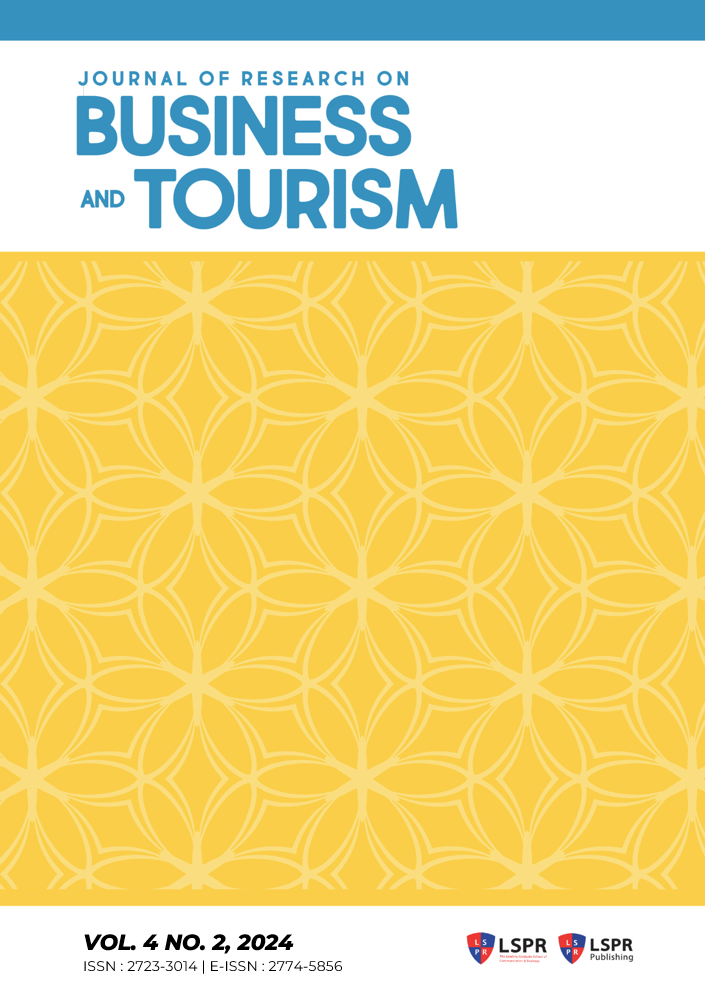Customer Preference Factors Affecting e-Groceries Purchase Intention in Indonesia
DOI:
https://doi.org/10.37535/104004220246Keywords:
logistic service quality, perceived convenience of e-groceries ordering, product information, app user interface, purchase intentionAbstract
Due to the 2020 COVID-19 pandemic, social distance restrictions, self-quarantines, and isolations all over the world made it impossible for brick-and-mortar stores to stay open. Merchants had to focus on the online ordering to boost sales and ease financial stress as they lost billions of dollars in sales and saw unemployment in the service sector rise. Because of these unusual circumstances, the online grocery ordering system, which lets businesses talk to their prospects and customers online, has become a necessity. Even though retail owners still face problems like losing a lot of money every year and being limited in how far away they can be from their customers, online ordering has protected their business. The App User Interface has an impact on Logistic Service Quality by enabling customers to select a delivery mode seamlessly. Product information, including price, distance, and delivery method, also affects the quality of logistic services. Furthermore, it is found that logistic service quality influences the perceived convenience of online shopping and that the perceived convenience of online shopping influences purchase intention.
References
Akram, U., Fülöp, M. T., Tiron-Tudor, A., Topor, D. I., & Căpușneanu, S. (2021). Impact of digitalization on customers’ well-being in the pandemic period: Challenges and opportunities for the retail industry. International Journal of Environmental Research and Public Health, 18(14), 7533. https://doi.org/10.3390/ijerph18147533
Badan Pusat Statistik (2021). HASIL SENSUS PENDUDUK 2020: Berita Resmi Statistik (No. 7/01/Th. XXIV) [Data Sets]. https://sensus.bps.go.id/main/index/sp2020
Badan Pusat Statistik Indonesia. (7 Februari 2022). Jumlah Penduduk Menurut Kelompok Umur dan Jenis Kelamin, 2021. https://www.bps.go.id/id/statistics-table/3/WVc0MGEyMXBkVFUxY25KeE9HdDZkbTQzWkVkb1p6MDkjMw==/jumlah-penduduk-menurut-kelompok-umur-dan-jenis-kelamin--2021.html?year=2021
Beauchamp, M. B., & Ponder, N. (2010). Perceptions of retail convenience for in-store and online shoppers. The Marketing Management Journal, 20(1), 49-65.
Bienstock, C. C., & Royne, M. B. (2010). Technology acceptance and satisfaction with logistics services. The International Journal of Logistics Management, 21(2), 271-292. https://doi.org/10.1108/09574091011071951
Bode, C., Lindemann, E., & Wagner, S. M. (2011). Driving trucks and driving sales? The impact of delivery personnel on customer purchase behavior. Journal of Business Logistics, 32(1), 99-114. http://dx.doi.org/10.1111/j.2158-1592.2011.01009.x
Brewer, P., & Sebby, A. G. (2021). The effect of online restaurant menus on consumers’ purchase intentions during the COVID-19 pandemic. International Journal of Hospitality Management, 94, 102777. https://doi.org/10.1016/j.ijhm.2020.102777
Chung, M., Moon, J., Yoo, B., & Choe, Y. (2006). Paradox of Information Quality: Do Consumers Pay More for Premium Product Information on E-commerce Sites?. Proceedings of the Twelfth Americas Conference on Information Systems, Acapulco, Mexico August 04th-06th 2006, 418-424.
Fakih, K., Assaker, G., Assaf, A. G., & Hallak, R. (2016). Does restaurant menu information affect customer attitudes and behavioral intentions? A cross-segment empirical analysis using PLS-SEM. International Journal of Hospitality Management, 57, 71-83. https://doi.org/10.1016/j.ijhm.2016.06.002
Fornell, C., & Larcker, D. F. (1981). Evaluating Structural Equation Models with Unobservable Variables and Measurement Error. Journal of Marketing Research, 24(4), 337-346. http://dx.doi.org/10.1177/002224378101800104
Hassanein, K., & Head, M. (2007). Manipulating perceived social presence through the web interface and its impact on attitude towards online shopping. International journal of human-computer studies, 65(8), 689-708. https://doi.org/10.1016/j.ijhcs.2006.11.018
Hou, Y., Yang, W., & Sun, Y. (2017). Do pictures help? The effects of pictures and food names on menu evaluations. International Journal of Hospitality Management. 60, 94-103. https://doi.org/10.1016/j.ijhm.2016.10.008
Kimes, S. E. (2011). The current state of online food ordering in the US restaurant industry. Cornell Hospitality Report, 11(17).
Kassim, N., & Abdullah, N. A. (2010). The effect of perceived service quality dimensions on customer satisfaction, trust, and loyalty in e‐commerce settings: A cross cultural analysis. Asia Pacific Journal of Marketing and Logistics, 22(3), 351-371. http://dx.doi.org/10.1108/13555851011062269
Li, Y., & Xie, Y. (2020). Is a picture worth a thousand words? An empirical study of image content and social media engagement. Journal of Marketing Research, 57(1), 1-19. http://dx.doi.org/10.1177/0022243719881113
Lin, Y., Luo, J., Cai, S., Ma, S., & Rong, K. (2016). Exploring the service quality in the e-commerce context: a triadic view. Industrial Management & Data Systems, 116(3), 388-415. http://dx.doi.org/10.1108/IMDS-04-2015-0116
Magnini, V. P., & Kim, S. (2016). The influences of restaurant menu font style, background color, and physical weight on consumers’ perceptions. International Journal of Hospitality Management, 53, 42-48. https://doi.org/10.1016/j.ijhm.2015.11.001
McCall, M., & Lynn, A. (2008). The effects of restaurant menu item descriptions on perceptions of quality, price, and purchase intention. Journal of foodservice business research, 11(4), 439-445. https://doi.org/10.1080/15378020802519850
Mentzer, J. T., Flint, D. J., & Hult, G. T. M. (2001). Logistics service quality as a segment-customized process. Journal of marketing, 65(4), 82-104. http://dx.doi.org/10.1509/jmkg.65.4.82.18390
Nusifera, A. N., Najib, M., & Kirbrandoko, K. (2020). Factor affecting user satisfaction in agricultural e-commerce applications: Facing the new normal. Journal of Innovation in Business and Economics, 4(02), 49-60. http://dx.doi.org/10.22219/jibe.v4i02.12954
Pappas, I., Sharma, K., Mikalef, P., & Giannakos, M. (2018). Visual aesthetics of E-commerce websites: An eye-tracking approach. Proceedings of the 51st Hawaii International Conference on System Sciences, 255-264. http://dx.doi.org/10.24251/HICSS.2018.035
Saura, I. G., Francés, D. S., Contri, G. B., & Blasco, M. F. (2008). Logistics service quality: a new way to loyalty. Industrial management & data systems, 108(5), 650-668. https://doi.org/10.1108/02635570810876778
Simangunsong, E. (2018). Generation-z buying behaviour in Indonesia: Opportunities for retail businesses. MIX: Jurnal Ilmiah Manajemen, 8(2), 243-253. https://dx.doi.org/10.22441/mix.2018.v8i2.004
Simangunsong, E., & Subagyo, I. (2021). Investigation and Analysis of Omnichannel Logistics Models: A Study in The Electronic Retail Industry in Indonesia. Operations and Supply Chain Management: An International Journal, 14(2), 221-231. http://doi.org/10.31387/oscm0450298
Stank, T. P., Goldsby, T. J., Vickery, S. K., & Savitskie, K. (2003). Logistics service performance: estimating its influence on market share. Journal of business logistics, 24(1), 27-55. https://doi.org/10.1002/j.2158-1592.2003.tb00031.x
Wansink, B., Painter, J., & Ittersum, K. V. (2001). Descriptive Menu Labels’ Effect on Sales. Cornell Hotel and Restaurant Administration Quarterly, 42(6), 68-72. https://doi.org/10.1177/0010880401426008
Wolfinbarger, M., & Gilly, M. C. (2003). eTailQ: dimensionalizing, measuring and predicting retail quality. Journal of retailing, 79(3), 183-198. https://doi.org/10.1016/S0022-4359(03)00034-4
Yeo, S. F., Tan, C. L., Teo, S. L., & Tan, K. H. (2021). The role of food apps servitization on repurchase intention: A study of FoodPanda. International Journal of Production Economics, 234, 108063. https://doi.org/10.1016/j.ijpe.2021.108063
Zeithaml, V. A., Parasuraman, A., & Malhotra, A. (2002). Service quality delivery through web sites: a critical review of extant knowledge. Journal of the academy of marketing science, 30(4), 362-375. http://dx.doi.org/10.1177/009207002236911











